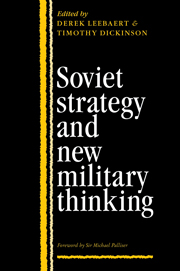Book contents
- Frontmatter
- Contents
- Notes on contributors
- Foreword
- Acknowledgements
- 1 The stakes of power
- Part I The instruments of power
- 2 Soviet nuclear strategy and new military thinking
- 3 The tightening frame: mutual security and the future of strategic arms limitation
- Part II Below the threshold
- Part III Managing the mission
- Index
3 - The tightening frame: mutual security and the future of strategic arms limitation
Published online by Cambridge University Press: 03 February 2010
- Frontmatter
- Contents
- Notes on contributors
- Foreword
- Acknowledgements
- 1 The stakes of power
- Part I The instruments of power
- 2 Soviet nuclear strategy and new military thinking
- 3 The tightening frame: mutual security and the future of strategic arms limitation
- Part II Below the threshold
- Part III Managing the mission
- Index
Summary
Nearly fifteen years ago I published an essay under a similar title at a time when there remained doubt as to whether the Soviet leadership accepted mutual deterrence and was seriously interested in strategic arms reductions and other limitations. There is now less doubt as to Soviet interest in deterrence and arms limitation. Today the real questions are, first, whether Soviet “new thinking” offers a way to go beyond stabilization of mutual deterrence through strategic arms limitations toward mutual security through nuclear disarmament, and second whether the United States is ready to do so. Indeed, if a decade ago it could be asked whether the Soviet Union was prepared to join the United States in arms control, the question now is whether the United States is ready to join the Soviet Union in going beyond mere arms control. This discussion will concentrate on the changes in Soviet political, military and security thinking that now pose the challenge, rather than on the American policy response.
The Soviets also see other important ideologically sanctioned uses of military force, but the basic Marxist–Leninist ideological framework predicates a fundamentally deterrent role for Soviet military power. The Soviets have, none the less, faced a doctrinal dilemma. While jettisoning Stalinist views on the inevitability of war and the necessary or desirable role of war as a catalyst of socialist advance in the world, as Communists they were predisposed to assume that socialism would be destined to survive and to triumph, even if a world nuclear catastrophe occurs. If they openly discarded that view, they long believed, it could place in question not only their whole world–view but also their basis for legitimacy.
- Type
- Chapter
- Information
- Soviet Strategy and the New Military Thinking , pp. 57 - 78Publisher: Cambridge University PressPrint publication year: 1991



